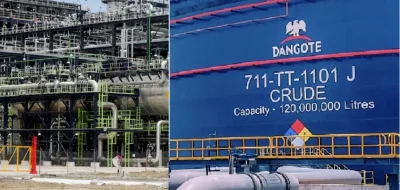The federal government’s initiative to sell crude priced in naira is losing momentum, the vice-president of Dangote Industries Limited, Edwin Devakumar, said in an interview with Reuters on Friday.
Early last month, Nigeria officially commenced the sales of crude oil and refined petroleum products in naira, with Dangote refinery focusing on local supply.
The refinery received four cargoes of crude oil from the NNPC under the naira-for-crude sale agreement a few weeks later.
However, according to Devakumar, the plant is still unable to secure adequate supplies despite the scheme.
“We need 650,000 barrels per day, (state oil firm NNPC Ltd) agreed to give a minimum of 385,000 bpd but they are not even delivering that,” he said.
He described the deliveries from Nigerian National Petroleum Company (NNPC) Limited under the scheme as “peanuts”.
Also commenting, an Acting Executive Director of the Crude Oil Refinery-owners Association of Nigeria (CORAN), Mathins Obaze, said Dangote is the only one of 8 operational refineries in Nigeria to have benefited from the naira-denominated crude sale arrangement.
“Members are still unable to access crude in naira and are currently engaging the government for a resolution,” Obaze said.
The 650,000 barrels per day capacity refinery was greeted by crude challenges when it began operations some months ago.
President of the Dangote Group, Alhaji Aliko Dangote, had cried out, saying some international oil companies were planning to sabotage the investment by refusing to supply crude.
The Dangote Group had alleged that the International Oil Companies (IOCs) insisted on selling crude oil to its refinery through their foreign agents.
According to the company, the local price of crude would continue to increase because the trading arms offered cargoes at $2 to $4 per barrel, above the official price.
The group also alleged that the foreign oil producers seem to be prioritising Asian countries in selling the crude they produce in Nigeria.
Despite the intervention of the Nigerian Upstream Petroleum Regulatory Commission (NUPRC) in July, the group insisted that the IOCs were still frustrating the refinery.


